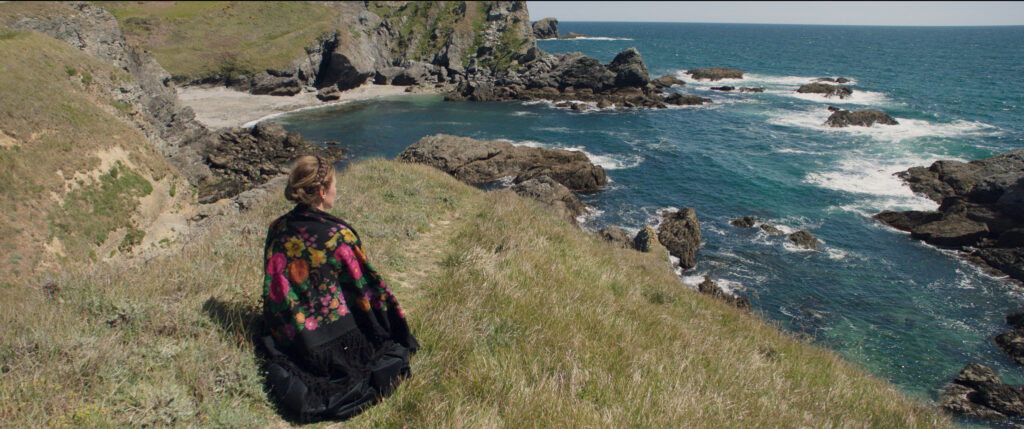October 2, 2022
by Carla Hay

Directed by Frederick Wiseman
French with subtitles
Culture Representation: Taking place sometime between 1910 and 1919, on Belle-Île, off the coast of Brittany, France, the dramatic film “A Couple” has only one person in the movie’s cast, in a portrayal of Russian writer Sophia Tolstaya, widow of Russian writer Leo Tolstoy.
Culture Clash: In the movie, Tolstaya reads out loud portions of letters and diary entries that she and Tolstoy wrote that detail their volatile and depressing marriage.
Culture Audience: “A Couple” will appeal primarily to people who are fans of filmmaker Frederick Wiseman and Tolstoy, as well people who are interested in the private life of a famous writer, but everyone else might be very bored by this movie.

“A Couple” is really about one-half of a couple. It’s a series of monologues where Nathalie Boutefeu portrays widow Sophia Tolstaya griping about how her marriage to Leo Tolstoy was unhappy. Boutefeu’s compelling performance saves this very repetitive film. Even though this writer couple was Russian, “A Couple” is a French-language film, probably because Boutefeu is French. The movie was also filmed on Belle-Île, off the coast of Brittany, France.
“A Couple” director Frederick Wiseman is mostly known for making documentary films, so “A Couple” is a departure for him, because it is a narrative feature, based on the personal writings of Tolstaya and Tolstoy. (Nominated several times for Nobel prizes, Tolstoy is best-known for his novels “War and Peace” and “Anna Karenina.”) Wiseman and Boutefeu co-wrote the adapted screenplay of “A Couple.” The movie had its world premiere at the 2022 Venice International Film Festival in Italy and its North American premiere at the 2022 New York Film Festival in New York City.
Boutefeu (in the role of Sophia) is the only person who appears on screen for the entire movie. She gives monologues where she reads letters and diary entries written by Tolstaya and Tolstoy that detail the couple’s troubled marriage. (For the purposes of this review, the movie character is referred to as Sophia, while the real-life Tolstaya is referred to as Tolstaya.) Tolstaya’s writings are read more in the movie than Tolstoy’s writings.
What emerges is a portrait of a cold and domineering husband who frequently cheated on his wife and inflicted various forms of emotional abuse on her. He mistreated her and acted like he wasn’t in love with her, but he also didn’t want her to leave him. In other words, “A Couple” isn’t a feel-good movie.
What the movie doesn’t give is any background information on the two people in this miserable marriage. In real life, Countess Sophia Behrs married Leo Tolstoy in 1852, when she was 18, and he was 34. They were married for 48 years, until his death in 1910, at the age of 82. Tolstaya died in 1919, at the age of 75. The couple had 13 children together, but Tolstoy fathered at least one other child through his chronic extramarital infidelity, according to this movie.
“A Couple” begins and ends with the widowed Sophia in a dimly lit room holding the letters that she will end up reading out loud during the course of this 64-minute movie. The rest of the film takes place entirely outdoors with lovely scenic views of the terrain where the monologues were filmed in grassy areas and on rocks near a beach. There are also some close-ups of some of the small outdoor insects (such as butterflies) that live in the grassy areas.
In these monologues, Sophia talks about her husband’s cruelty and how he often seemed like he regretted marrying her. “It took me years to understand your moods, your demons,” she says. She also seems to struggle with her love/hate feelings about her husband.
“I am still in love,” she says. “You illuminate my life.” But she also says, “For you, I am nothing but a mangy dog.” She continues, “I feel abandoned. I don’t have a husband/friend.” She later says, “I envy the couples who enjoy a spiritual bond with a physical relationship.”
Sophia details this loneliness in the marriage when she talks about how her husband preferred to spend time playing piano for four to six hours a day, or taking long walks by himself, instead of spending that time with her and their children. He was also disinterested in putting up a happy front to people about this marriage. “Remember the modest party for our 10th anniversary?” she asks aloud in a superficial manner, as if the size of an anniversary party is supposed to reflect how much spouses love each other.
To add insult to injury, her husband’s mistress lived nearby with the son allegedly born from this extramarital affair. And so, Sophia has to endure the humiliation and having this reminder of his infidelity near her and the children. “Disenchantment has invaded our life,” she says mournfully. If the marriage had any happiness, it’s not depicted in this movie.
Sophia also expresses bitterness about how in 30 years of marriage, her husband never spent time showing concern when any of their children got sick. She talks about feeling like the only one in the marriage who took on the responsibility of being a nurturing parent to their children. And it goes without saying that Sophia’s writing career wasn’t allowed to flourish in the way that her husband’s writing career thrived.
The movie’s scenes also include descriptions of the husband’s vicious temper. According to the movie, he would throw breakable things when he got angry. And when Sophia tried to leave him, he dragged her while she was “half-naked” back their house. The abuse in the marriage got so bad for her, Sophia exclaims in a diary entry: “Take me to the police or to the madhouse!”
Boutefeu infuses these monologues with all the visceral emotions of a spouse desperately trapped in a bad marriage but conflicted enough that she holds out hope that things might improve and her husband will show that he might still love her. Sophia mentions that their children are her main sources of joy and the biggest reason why she’s staying in the marriage. It’s a story that unfortunately is not unique to any particular time period or culture, because these toxic relationships can happen to anyone at any time.
Boutefeu’s acting is the main thing that “A Couple” has to offer that gives some emotional context to the words that are being recited on the screen, because there’s nothing particularly special about the movie’s cinematography or editing. After a while, it gets redundant to hear the same marital complaints being said out loud. Don’t expect “A Couple” to give any major insight into how these literary couple worked on any of their writings that weren’t these diary entries or personal letters.
If the total running time of “A Couple” had stretched to 90 minutes or more, the movie definitely would have overstayed its welcome. Clocking at a little over one hour is just about the length time before “A Couple” would start to slide into irredeemable monotony. This movie would have been even better if it had been a short film. As it stands, “A Couple” can be recommended only for those curious to take an uncomfortable peek inside the grim marriage of Tolstoy and Tolstaya, giving some insight into why their writing was about so much angst, suffering and betrayal.
Zipporah Films will release “A Couple” in select U.S. cinemas on November 11, 2022.
